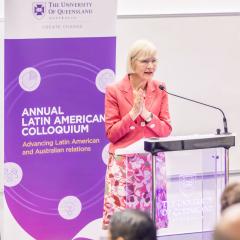Article posted by Australia Award Indonesia 23 July 2024
The Indonesian Ministry of Health defines digital health transformation as the changes within health systems and practices driven by the adoption of digital technology and innovation. This transformation is not solely about creating new digital healthcare applications; it can also involve optimising existing applications or systems.
 Dr Lady Margaretha Febriany Sirait has exemplified this approach since attending the Australia Awards Short Course on Digital Technologies in the Healthcare Sector (including Telehealth) at The University of Queensland in 2022.
Dr Lady Margaretha Febriany Sirait has exemplified this approach since attending the Australia Awards Short Course on Digital Technologies in the Healthcare Sector (including Telehealth) at The University of Queensland in 2022.
Her innovations have significantly advanced digital health transformation in Jakarta. In 2022, while serving as the Program Manager for Hepatitis and Gastrointestinal Tract Infections at the Jakarta Health Office, Lady was particularly drawn to the short course’s theme.
"I knew Australia's digital health is more advanced than Indonesia's. I was curious about how digital health is implemented in Australia, both in terms of disease prevention and management," said Lady, who holds a Master of Science in Healthcare Administration from Nagoya University.
During the two-week course in Queensland, Lady’s learning experience was comprehensive and well-rounded, combining classroom learning with site visits to observe digital health implementation. This included visits to the RECOVER Injury Research Centre and The Princess Alexandra Hospital Telehealth Centre.
"Despite the tight schedule, I was pleased because I not only learned in the classroom, but I also had the opportunity to visit several government agencies, research centres, and digital health facilities to see best practices in digital health in Australia," Lady recounted.
Lady was particularly interested in how Australia involves Indigenous people in digital health services. "From the cases of Indigenous people in Australia, I learned that as healthcare professionals, we must strengthen our approach to the community and fellow healthcare workers to drive digital transformation. I successfully applied this when implementing my Award Project for the hepatitis program."
Integrating Intersectoral Databases for Improved Hepatitis Reporting
After returning from Australia, Lady teamed up with fellow Short Course participants Aulia Zahrina Qashri and Paulus Wisnu Aditya Basworo from the Ministry of Health’s Digital Transformation Office and Dr Verry Adrian from Jakarta Health Office on a project called ‘Puskesmas Information System Integration with SIHEPI for Better Outcome Results in Hepatitis Reporting’ (PISTOLING).
"PISTOLING aims to integrate data from the community health centre (Puskesmas) with the Ministry of Health and the Health Office, synchronising the 'Puskesmas Management Information System' (SIMPUS) with the 'Hepatitis and Gastrointestinal Tract Infections Information System' (SIHEPI)," Lady explained.
Her commitment to PISTOLING was driven by her extensive experience in Jakarta’s Puskesmas, where she encountered the complex reporting processes for hepatitis B and triple elimination (hepatitis, HIV, and syphilis) in pregnant women, as well as hepatitis C in key populations (convicts, haemodialysis patients, people with HIV, and narcotic injection patients).
"Before PISTOLING, health workers at Puskesmas had to manually create reports multiple times before submitting them to the Health Office and the Ministry," Lady said.
Instead of creating new applications and adding to the abundant digital health apps, Lady opted to utilise the existing SIMPUS in every Puskesmas to integrate data with the Ministry of Health.
Throughout PISTOLING’s development, Lady sought input from the University of Queensland’s Centre for Online Health (UQ-COH), consulting with Senior Telehealth Consultant Helen Haydon, Director of UQ-COH Professor Anthony Smith, and Professor of Business Information Systems Andrew Burton-Jones.
"From Helen, Anthony, and Andrew, I learned to ensure our innovation runs smoothly and is user-friendly. One key step is ensuring it assists healthcare workers," Lady explained.
Listen to Dr Helen Haydon talk about the benefits of getting involved in International Development projects
Plan to Improve Digital Mental Health Services
As of December 2023, Lady has transitioned to Head of the Productive Age, Elderly, and Mental Health Section at the Jakarta Health Office. She now oversees the planning and implementation of public health programs for the productive-age population, the elderly, and mental health issues.
"I plan to apply my digital health knowledge from the Short Course to improve the quality of the mental health consultation service website, which currently lies dormant despite receiving many messages," she said.
Lady also mentioned her plans to collaborate with Verry to develop the Sahabat Jiwa application, a web-based mental health consultation service provided by the Health Office.
"We plan to consult with Professor Anthony Smith, a Psychologist, Research Fellow, and Telehealth Consultant at UQ-COH, for suggestions on improving Sahabat Jiwa, which is gaining a significant number of users. Mental health issues are increasingly being discussed and are no longer taboo," Lady concluded.
Read full article on Australia Awards in Indonesia
The Australia Awards Short Course on Digital Technologies in the Healthcare Sector (including Telehealth) was managed by UQ International Development. UQ’s International Development unit is one of the leading university development groups in the Asia-Pacific region, helping to build the capacity of people and organisations around the world to achieve their development goals.



